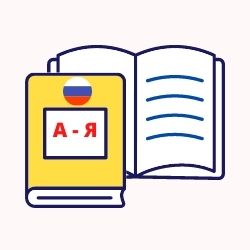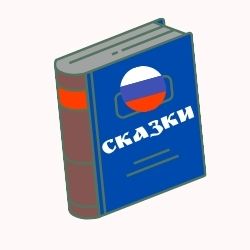In this article:
How to learn Russian?
If you ask yourself how to learn Russian or any other language, you’ve come to the right spot!
This blog post will help you develop your Russian language learning strategy!
In fact, no matter whether you want to speak a foreign language in three months or learn juggling over the weekend, there are some recipes for those who need a quick and sure start.
Follow this learning strategy
The following recommendations are more generic and apply to learning anything new:
- Decide why you want to study it and how much time a week you are willing to give to anything new.
- Analyze the load and determine what you need to focus on, make sure you break the information/tasks into small, manageable chunks.
- Move forward with the “minimum effective dose”. A small step is easier to turn into a habit, and it will less likely cause you to quit. If you learn a language, select the most important and most frequently used words, perhaps, organize them by themes, and learn a few words each day.
- Do not overload your short-term memory trying to do too much at once. This part of our memory is used for upcoming tasks, and it fills up quickly when you are confronted with something new and unfamiliar.
- Concentrate and remove extra learning sources. Thus, once you’ve got a moment, you will be able to “switch in” immediately and spend less time searching, which takes a lot of time.
How to Learn Russian – A Step-by-Step Guide
Each of the techniques mentioned above works well but together they are a real force.
Furthermore, if you want to start learning Russian or progress with your Russian once you already have some basic knowledge, I have prepared for you 10 easy-to-follow tips for learning Russian.

How to learn Russian?
recommended hours a day 1 hour
Start with a teacher/follow a course

If you are just starting, I highly recommend you take private or group courses for beginners. Why is this important? Because you will be more organized and less inclined to drop off when things get tough – and they might get tough because anything new we learn is a stress for our brain and the normal response of our brain is to avoid it.
Take time to do your homework

At any stage – be it a course for beginners or intermediate learners – do not skip your homework. Simple advice but it really works! Doing your homework helps your brain process and store information much better.
No matter what you study, you need some time on your own to figure out the puzzle of your subject. At one stage, you will have this AHA moment – when everything will just start to make sense, the rules of Russian grammar will not seem like a bunch of boring orders but like a very logical system. You will notice regularities and understand the logic of the Russian language.
Find patterns in the Russian language

Always try to find patterns. For example, all Russian adjectives in nominative case in feminine gender have distinct endings -ая /-яя, e.g. большая [bolshaya]. In English, the suffix -ful mostly belongs to adjectives and means “having the qualities of”, e.g. watchful, grateful. Finding and understanding the component parts will accelerate your progress.
Once you can figure out these regularities in the written text, the phrases will start making much more sense.
So, the most important thing to do is to see language as a system, not a list of rules, there is a logical structure you just need to grasp.
Learn basic Russian vocabulary

Did you know that knowing only 1000 most common Russian words covers over 80% of basic everyday vocabulary? I have a free ebook on my website with such words – you can download it and learn at your own pace. See links below.
Russian words are not a puzzle but a well-organized construction. Knowing basic words will help you understand more words without a dictionary.
See for yourself: работа – noun ”work”, работать – verb ”to work”, рабочий – adjective ”working”. Verbs have ending -ть and adjectives in masculine have ending -ий or -ый.
So just knowing the word “работа” and the word formation patterns unlocks many more words for you.
Mind conjugation rules in Russian

And then, these words conjugate – in Russian pretty much every part of speech conjugates according to its own rules. So, when you see phrases like я иду на работУ (I am going to work), я иду домой с работЫ (I am going home from work), работЫ нет (there is no work) – it’s still the same noun “работа” (work) conjugated by cases.
Same about verbs: e.g., я работаЮ (I work), он работаЕТ (he works), я работаЛА (I worked – speaking about a woman), он работаЛ (he worked – speaking about a man) – this is still the same verb “работать” (to work) conjugated according to gender and time.
Learning verb conjugation is boring and does not give quick results. Instead, remember a few frequently-used verbs, in this way, you will not only have ready-made conjugation forms in your mind but unlock a large part of the language pattern, which, in its turn, will allow you to conjugate other Russian verbs.
Read in Russian regularly

Let’s say, you already took a basic course or purchased a book on essential Russian grammar and studied it all, what happens next? How do you actually advance afterward?
Basic grammar and vocabulary are essential because they explain the “why”, and use this basic knowledge – either in the form of a course or a book – as something you can come back and revise later, if needed.
However, to understand Russian – you need to start listening and reading in Russian, and to speak Russian – you need to start speaking. It’s very simple, but not so easy to achieve because this step requires very good self-organization.
Now, some people have this skill, some not. People who already have experience studying other languages are used to working with information, rules, and finding patterns in a language. Did you notice: the more languages you know, the easier it is to learn a new language?!
So, expose yourself to as much Russian as possible: start with side-by-side short stories, fairy tales, and phrasebooks. The best is if you read a story with a familiar plot. Slowly move to reading blogs, and following Russian-speaking people on social media.
In language learning, regularity is king. Remember, even several minutes a day is better than several hours once a month.
Make notes when reading

There are 2 approaches to reading in a foreign language. The 1st one is to just read, go with the flow, and grasp the overall meaning without using a dictionary. And the 2nd one is to study with a pen, a paper and a dictionary.
I support the second one because it works for me when I study a language. I like to make notes and I feel like I progress by learning new words rather than just leaving this opportunity behind.
Tip: buy yourself a notebook specially dedicated to learning Russian – where you’ll put new words, some questions to explore later, and so on. In general, make a habit of using paper and pen more often.
If a blog or a book you are reading is online – print it and work on it; make notes, question marks, underline useful phrases. You’ll use additional power of motor and visual memory by doing so.
Watch in Russian with subtitles

For comprehension practice, start with cartoons, movies and documentaries with subtitles in Russian or English. The best is if you like the topic of these videos. This way you will learn faster and it will be easier to stay engaged.
I invite you to subscribe to my YouTube channel and browse through the playlists. I have organized the content by levels, I am sure you will find a lot of useful videos.
Speak UP

When traveling to a Russian-speaking country, never miss an opportunity to speak with Russian natives, try to engage as much as possible in Russian.
Practice makes perfect

Don’t be afraid to make mistakes – even Russian natives make them! You will be understood and your efforts will be greatly appreciated!
And finally, explore these useful resources for learning Russian

Browse through the links below: these educational resources will definitely help you advance with your Russian!
Self-study resources to learn Russian on your own
Basic Russian Vocabulary – Russian Phrasebook & Dictionary
Russian Cases Course and ebook
Russian Essential Grammar and Phrasebook
Listen and Read in Russian: A Comprehensive List of Resources
Russian Cartoons with English subtitles
Best Online Tools to Learn Russian
Watch the video on my YouTube channel where I speak about how to learn Russian
I wish you good luck and see you later as my social media followers or my students.
Follow ExpressRussian on
for your daily dose of awesome educational content for learning Russian!
What about you? Which languages do you study and what are your learning strategies? Write in the comments below.


4 replies on “How To Learn Russian – 10 Easy Tips To Learn Russian”
One of the things I like to do is whenever the chance presents itself is to count items in Russian…один, два, три, четыре, пять, шест, семь, восемь, девять, десять, одиннадцать и так далее. Also whenever there is time practice by typing whatever comes to mind in Russian. And of course inculcate! If there is nothing to associate a word or phrase it becomes a bridge too far. The saying “Яблоко от яблони недалеко падает.” which was taught to me by one of your colleagues came very easy because of the familiarity. спасибо! Best to you from here!
Great tips!
[…] How to Learn Russian Fast […]
[…] How to Learn Russian Fast […]